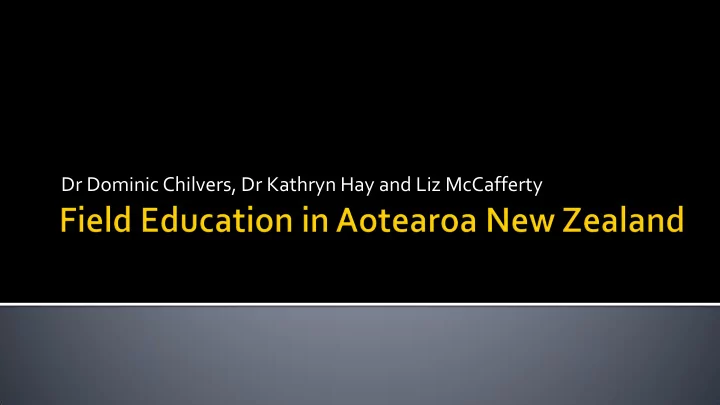

Dr Dominic Chilvers, Dr Kathryn Hay and Liz McCafferty
Field education in Aotearoa New Zealand The field education position paper National training and professional development initiative Professional suitability guidelines Moving forward: recommendations from the position paper Questions and discussion
18 providers of 4 Year BSW qualifications – Uni/Poly/ Wānanga /Private Review of Vocational Education 2019 Competition for placements, pressures geographically Longstanding cooperative relationships with field education staff Pressures from students and the providers around placements Work-integrated learning is gaining traction in tertiary institutions Universities NZ work-integrated learning committee Ministerial review of social work education – focus on field ed The development of a field education position paper
SW education has been offered for over 40 years Programme standards set by government regulator Māori and Western pedagogical models so delivery varies 120 days minimum field education experience 1272 placements in 2017 – concerns about saturation Collaboration and competition Diverse learning environments for students Limited quality assurance data or minimum standards
Government funding does not recognise field education demands Limited recognition in workload planning in education No additional support for students’ additional costs Not recognised by employers in job descriptions Founded on a system of good will Employers want students most likely to be employed Partnership approach is required but often absent Review of resourcing by all players is required
Field educator training is valued by practitioners Costs and outcomes of training are questionable Field education is a complex interdependent context requiring a holistic approach to initial training and ongoing support Initial training is institution specific and of variable quality Field educator guidelines could guide training and development Learning community model – Professional association National repository of field education resources
Preparatory skills teaching is labour intensive Field educators may feel anxious about teaching integration Managing marginal or failing students requires a partnership approach and considerable support from educators Field educator competency concerns test frail partnerships Live supervision and observation is an area of weakness Standardised assessment outcomes could add value
Desire to develop consistency in training of field educators/mentors Field educators/mentors often taking students from different providers Emphasis on commonalities and to demonstrate collaboration Aim to increase knowledge and skills for field educators/mentors National FE Guidelines enable a strong foundation for the training Current focus: Face to face orientation to field education session – (5 providers involved) Establish partnership between ANZASW and CSWEANZ Online resources, e.g. video on what is field education; why become a field educator; what students want from their placement
SWRB require applicants for registration to be “a fit and proper person to practice social work” Implications for educators particularly in field education Variability of systems around professional suitability CWEANZ Field Education sub committee project: process
Criminal offences Health issues Character Professional background Portfolio Guidelines don’t remove the grey areas but they do have the potential to support field education co-ordinator practice
Review resourcing for field education – all players Research the impact of placement duration Map placement provision and link to enrolments Regional and national approaches to organising placements Standardised quality assurance form for all education providers Identify a lead organisation to champion field education and provide a learning community, resources and information Professional standards framework for field educators Some standardisation of learning outcomes and assessment Develop a student capabilities framework
Comments and Questions
Recommend
More recommend